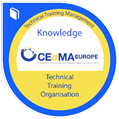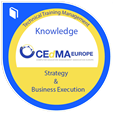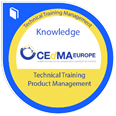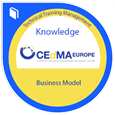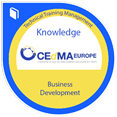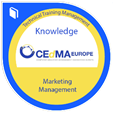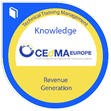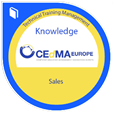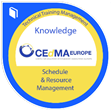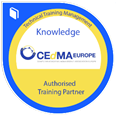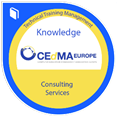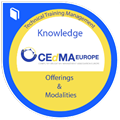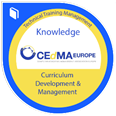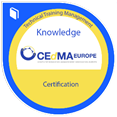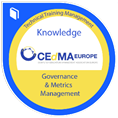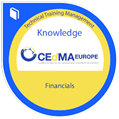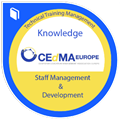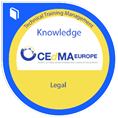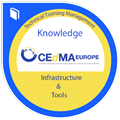Knowledge Modules (printable)
|
|
Foundation K01 - Technical Training Organisation Course Summary: Introduction to the key elements and activities Introduction: This module gives an overview of what a technical training organisation provides in terms of its scope, key activities, structure and rationale, and an introduction to the evolving discipline of customer success management and the part it plays in its overall success. Topics:
Prerequisites: The Foundation Series Duration: 30 minutes |
|
|
Foundation K02 – Strategy and Business Execution Course Summary: Developing strategies to produce working plans to execute and drive results Introduction: Successful commercial training organisations require a clear strategy and business execution plan in order to achieve, monitor and control the attainment of their goals and objectives. This module looks at a typical approach to this, including the associated components and activities required to develop the strategy that can be used to develop an executable plan. Topics:
Prerequisites: The Foundation Series Duration: 30 minutes |
|
|
Knowledge K03 - Training Product Management Course Summary: Planning and introducing the right offering at the right time and right price point Introduction: Technical training product management encompasses the process of designing, building, operating and maintaining the training offering. Many technology-based companies apply product management techniques to ensure they are creating a training service that motivates and adds value, with the end objective to ensure the customer wants to buy and continues to apply training for business benefit. Product management also takes into account the current marketing need, position, price and lifecycle management to ensure continued fitness for purpose over time. This module looks at roles and responsibilities of employees engaged in supporting the process, including details on the specific elements and activities associated in implementing a typical product management lifecycle. Topics:
Prerequisites: The Foundation Series Duration: 60 minutes |
|
|
Knowledge K04 - Business Model Course Summary: Key components required to convert strategy to actual execution Introduction: After you have a clear strategy and business design, the next stage entails converting the output into tangible and measurable results. This module looks at the steps required to establish the critical tasks and business interdependencies across the training and corporate organisation. This will include financial planning and management, business control and metrics, building or rebuilding an organisation, the establishment of a business climate and employee culture, and delivering the business value proposition. Topics:
Prerequisites: The Foundation Series Duration: 30 minutes |
|
|
Knowledge K05a - Business Development Course Summary: Building a training business Introduction: Establishing, growing and maintaining a training business as it moves forward requires strong skills in business development and awareness of marketing management. This module looks at the roles and responsibilities of a business development manager (BDM) in terms of the activities required to develop and grow the business in line with the agreed strategy. Topics:
Prerequisites: The Foundation Series Duration: 40 minutes |
|
|
Knowledge K05b - Marketing Management Course Summary: Managing the success of the business Introduction: Sales and marketing components of business development are covered now. The sales element covers discount policies, vendor specific objective evidence (VSOE), attach rates, and competitive and tactical strategies. The marketing element covers demand and lead generation, promotional materials and the implementation of customer, advisory and reference programs. As new technologies enter the training sphere, they have the potential to influence the way in which organisations gain a competitive edge through disruptive business growth. This is briefly discussed near the end. Topics:
Prerequisites: The Foundation Series Duration: 60 minutes |
|
|
Knowledge K06 - Revenue Generation Course Summary: Making money in the mixed modality world of technical training Introduction: Revenue income can be achieved from two main sources, direct and indirect. On the direct side, it includes training sales, professional services and product sales teams. On the indirect side, it includes authorised training partners, channel partners and strategic alliances. This module looks at the various pricing models that a training department might support, including how revenue can be generated via royalty payments, kit sales and revenue share schemes. It also considers the challenges associated with geographic pricing and how to maximise and protect revenue. The final sections cover renewals and the role of a customer success manager in maintaining regular contact with existing customers, to assist in maximising their use of training and their associated investment in it. Topics:
Prerequisites: The Foundation Series Duration: 50 minutes |
|
|
Knowledge K07 - Sales Course Summary: Developing strategies and metrics to manage sales goals Introduction: Buying and selling is a transaction where both the seller and the buyer engage in a process of negotiation resulting in value being obtained on both sides. The seller gains revenue and the buyer gains a training offering enabling them to be more knowledgeable, gain skills and ultimately be competent in what they do. The selling process has implied rules and identifiable stages that require strategies, operating processes and metrics to be established to achieve the business goals of the training department. The role of sales management is to ensure that a systematic approach to the sales process is implemented, guaranteeing that sales personnel remain focused, motivated and incentivised to achieve their sales targets. Topics:
Prerequisites: The Foundation Series Duration: 40 minutes |
|
|
Knowledge K08 - Schedule and Resource Management Course Summary: Planning to deliver on the training market opportunity Introduction: Selling to an opportunity is in itself a business challenge. However, it is catastrophic not to have the capability to deliver. This is where understanding and interpreting demand is key, especially in relation to managing the business for both commercial and product success. This module discusses the main tasks associated with scheduling and resourcing training courses together with understanding and interpreting demand, including how to cater for regional variance by way of enhancing or minimising the curriculum on offer. Practical challenges covering scheduling the right modality for the right market need, managing the delivery resource in an efficient manner, managing cost and revenue expectations, and factoring in international needs are then outlined and a scheduling checklist provided for reference and consideration. Topics:
Prerequisites: The Foundation Series Duration: 80 minutes |
|
|
Knowledge K09 - Authorised training partner management Course Summary: Expanding sales and delivery capability through qualified third parties Introduction: By establishing a training partner network, a vendor can control, monitor and expand sales and delivery coverage in a consistent and effective manner without having to commit to large investments in staff and resources. This module looks at the advantages and considerations regarding the establishment of a partner network, including the different partner types such as distributors, resellers and training partners. It also outlines the decisions that have to be made regarding the type of business relationship required, contractual needs, how revenue will be recognised, quality control, territory management and how partners will be rewarded. Topics:
Prerequisites: The Foundation Series Duration: 30 minutes |
|
|
Knowledge K10 - Consulting services Course Summary: Expanding the training offering with broader customer-aligned services Introduction: Training organisations who provide consulting services gain the ability to assist customers in maximising the effectiveness of their investment in the technology purchased, and that of their employees. Establishing trust and respect enables the building of strong and long lasting business relationships. Consulting provides the means to positively influence the customer’s experience by applying their skills in strategy, planning, implementation and execution to ensure the achievement of desired goals. This module outlines the service offering and details the main steps that a training group needs to consider if looking to offer consulting as a service to their customers. Topics:
Prerequisites: The Foundation Series Duration: 50 minutes |
|
|
Knowledge K11 - Offerings and modalities Course Summary: An insight into what they are Introduction: A training offering can be considered in terms of what is being taught, whereas a training modality is the way in which the training is delivered. Many training organisations will provide a training offering on product XYZ, which students can enrol on to suit their preferred learning style; whether that offering is instructor-led or eLearning can then be referred to as a learning modality option. This module explains in more detail what training offerings and modalities are available or under future consideration within the industry. Topics:
Prerequisites: The Foundation Series Duration: 35 minutes |
|
|
Knowledge K12 - Curriculum development and management Course Summary: Designing and managing the training offering Introduction: This module introduces the main activities and considerations regarding the development and management of a training curriculum, starting with how to define curriculum objectives, understanding what a minimum curriculum is and how to define audience types. This is followed by an introduction to the content development models, ranging from the traditional Analyse, Design, Develop, Implement, Evaluate (ADDIE) through to the latest rapid development method known as AGILE (Align, Get set, Iterate and implement, Leverage, Evaluate). Lifecycle management, covering content development and content shelf life, is then outlined and discussed, followed by an introduction to the costs associated in developing different modalities and how to defend investments made in curriculum development. The final section looks at authoring tools and the selection criteria that needs to be considered in choosing one of them. Topics:
Prerequisites: The Foundation Series Duration: 35 minutes |
|
|
Knowledge K13 – Certification Course Summary: Requirements and approach to designing exams Introduction: Certification is used to validate the skills and competencies of an individual’s level of proficiency. Most IT companies implement certification programmes to validate their channel partners and ensure that customers have the skill required to be competent in their roles. In this module, the process of certification development, legal defensibility, item writing and proctored versus unproctored examinations are discussed. Topics:
Prerequisites: The Foundation Series Duration: 45 minutes |
|
|
Knowledge K14 - Governance and metrics management Course Summary: Establishing control with confidence Introduction: This module outlines the importance of being able to track, monitor and assess the success or challenges facing a training group, including the importance of establishing quantifiable metrics and governance processes. These metrics need to reflect how the business is operating in the achievement of its long- and short-term objectives, sufficient to provide insight in order to establish relevant controls that protect and steer the business. Topics:
Prerequisites: The Foundation Series Duration: 30 minutes |
|
|
Knowledge K15 – Financials Course Summary: Fiscal management and control Introduction: This module covers financial management, which is based on the planning, organising, directing and controlling of all relevant financial activities associated with the running of the training department. In some instances, this is undertaken in conjunction with a dedicated corporate finance department. Typically, it covers investments regarding fixed assets known as capital budgeting, staffing and operational costs, with requirements to achieve targets such as Profit and Loss (P&L), Cost Recovery or Cost Centre but sometimes a combination of all of them. Topics:
Prerequisites: The Foundation Series Duration: 50 minutes |
|
|
Knowledge K16 - Staff management and development Course Summary: Getting the best from your key assets - the training team Introduction: This module explains what is required to establish and maintain a team of employees to achieve business performance in line with agreed goals and expectations. For any organisation to be successful, enablement models need to be established that align and monitor business performance through the combination of individual employee competencies. These models form the basis by which the business objectives can be mapped to a series of business activities, which can then be grouped into competencies, roles and responsibilities. Topics:
Prerequisites: The Foundation Series Duration: 40 minutes |
|
|
Knowledge K17 – Legal Course Summary: Protecting the training business Introduction: This module introduces and explains the legal requirements that a training department needs to consider in order to protect itself, its partners and its customers. It looks into the various legal facets to be considered, including import and export restrictions and regulations, trademarks, indemnity and liability, intellectual property and data protection. Topics:
Prerequisites: The Foundation Series Duration: 40 minutes |
|
|
Knowledge K18 - Infrastructure and Tools Course Summary: Introduction to the systems and technical needs required to run a training business Introduction: This module provides an insight into the training infrastructure and associated tools to consider for the running of a successful training business. The decision to purchase, subscribe, operate independently or integrate a tool via a SaaS solution is one of choice driven by cost, management overhead, scalability and access considerations. Topics:
Prerequisites: The Foundation Series Duration: 40 minutes |

